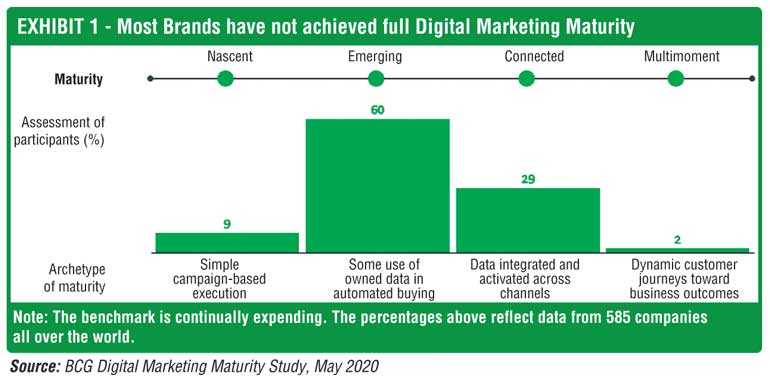Saturday Feb 21, 2026
Saturday Feb 21, 2026
Tuesday, 5 January 2021 00:46 - - {{hitsCtrl.values.hits}}

It’s the beginning of a new decade and we believe it is safe to say that digital interfaces are now becoming a mainstay. Digital is increasingly holding sway in the consumption decision with 80% purchase decisions, especially those related to apparel, beauty, and electronics businesses, being influenced digitally.
At the same time, businesses are increasingly engaging with customers over digital channels and striving to become an integral part of the customer journey. Digital marketing plays an important role in enabling these engagements. In order to have the desired impact, the digital marketing strategy should be able to deliver the right message to the right person at the right time in the right place.
For organisations that can optimally improve their digital maturity and build their technical and organisational muscle, the results can be as impressive as up to 2x digital sales and up to 50% reduction in cost per acquisition.
What is digital marketing?
Digital marketing is simply advertising done through digital channels ranging from search engines and websites to email and mobile apps. It has gained significant traction over the years with firms adopting new tools and innovative technology for optimisation.
This has birthed MAdTech (Marketing and Advertising Technology), allowing marketers to connect with their target audience through new and innovative channels. Paradoxically, digital marketing humanises the brand building process and allows companies to foster more authentic customer relationships.
Assessing the level of digital marketing maturity
BCG has conducted a maturity study including workshops and interviews with senior marketers from over 200 global brands in 10 industries. Only 2% of the companies in our global benchmark study fall into the most advanced category.
This category has been called “multimoment” because the companies in it can deliver relevant content to consumers at every point of the purchase journey (see Exhibit 1). However, a large proportion of companies are at earlier stages along the continuum towards digital marketing maturity: either at the relatively early “emerging” stage (60%) or at the somewhat farther-along “connected” stage (29%).
Challenges in reaching digital maturity
Successful digital marketers today can intuitively anticipate the consumers’ changing needs and accordingly craft a personalised journey of outreach, interaction, and product/service offering. However, getting this journey right involves many data, technology and process challenges.
Future: Progressing on the digital marketing maturity continuum
There are four key digital success factors that can enable a company to progress along the digital maturity curve.
1. Brand communication
The digital acquisition journey begins by creating brand awareness. However, its success hinges upon whether the content is relatable and engaging. Thus, brand marketing communication needs to expand its horizons and also focus on brand storytelling through digital and social media channels.
2. Qualified traffic generation by optimally leveraging technology
Leveraging the relevant analytics tools can help brands better harness data and glean valuable customer insights. Further, it can also help them build a robust sales pipeline, enhance customer engagements, and offer customised services. However, mature marketers must build connected data linking all their data sources, online and offline, to define their target audiences to create a 360° view of the customer. This can be enabled through an array of marketing technology tools that permit automation of data, integrated tech, and content at scale. Additionally, it can help marketers identify the most valuable touchpoints along the customers’ purchase journey and accordingly set KPIs and measurable business outcomes.
3. Lead to sales conversion and activation
The company landing page is often considered the gateway to a brand. Similarly, it can also act as a conduit to the customer. Thus, it becomes critical to optimise the landing page by improving its performance, providing deeper and richer content, enhancing the UI/UX quality, improving lead forms, etc. These are all critical to converting traffic into leads and understanding where the customer is on the purchase journey. Once this data is available, lead-nurturing digital outreach can be leveraged to provide the right information to the right person at the right time. The final conversion to sales can be
done via an E2E digital sales process, via assisted sales (call centre, customer support) or even via a research online, purchase offline (ROPO) to store approach. The most integral part is to capture the shopper’s response to the experience that has been delivered and adjust the messaging accordingly. This feedback loop would not only help optimise customer experience, but also help decision makers adjust marketing spends based on trends and opportunities.
4. People and organisation
Marketers operating in silos are seldom able to meet the wider organisational goals in terms of brand visibility and customer acquisition. Thus, it becomes paramount for organisations to adopt a collaborative approach and build strategic partnerships with agencies and marketing-tech providers. At the same time, they need to ensure that adequate data protection measures have been established and that they continue to have direct control over the relevant technology. In addition to external partnerships, companies must also hire and train technical talent with specialist skills and integrate these people with other members of the marketing staff to create effective cross-functional teams. An agile approach to digital marketing can help organisations proactively identify the gaps in the digital marketing strategy and plug them in a timely manner.
A combination of the above enablers can help organisations progress along the digital maturity curve and ensure that note only the customers that they had yesterday continue to be their customers tomorrow but also acquire entirely new customers.
(Chilman Jain is Principal and Natarajan Sankar is Managing Director and Partner, Boston Consulting Group. Views are personal.)
(Boston Consulting Group is a premier global management consulting firm founded in 1963. BCG partners with leaders in business and society to tackle their most important challenges and capture their greatest opportunities.)